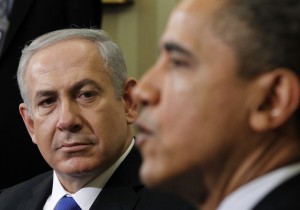 The United States was behind Europe’s condemnation of Israel for approving thousands of housing units in Jerusalem and the West Bank, an Israeli official said.
The United States was behind Europe’s condemnation of Israel for approving thousands of housing units in Jerusalem and the West Bank, an Israeli official said.
“The European move is essentially an American move. The Brits asked the Americans how to act,” an unnamed Israeli official with close ties to the U.S. administration told Ynetnews.com.
Despite mounting international pressure, Israeli Prime Minister Binyamin Netanyahu’s office issued a statement saying Jerusalem would “continue to stand up for its vital interests even in the face of international pressure.”
Israel’s ambassador in Australia was summoned Tuesday in protest the Israeli decision to expand settlements in the West Bank and east Jerusalem and withhold tax revenues from the Palestinian Authority, The Jerusalem Post said. In Europe, countries such as Britain, France, Spain, Sweden and Denmark took similar action.
On Monday, Israel said the Jerusalem District Planning and Construction Committee intends to discuss next week a plan to build an additional 1,600 housing units in the city’s Ramat Shlomo neighborhood. The construction in the neighborhood was approved in March 2010 during a visit by U.S. Vice President Joe Biden, Haaretz noted.
Hours after the U.N. General Assembly voted last week to upgrade the U.N. status of the Palestinian territories of the West Bank, east Jerusalem and Gaza Strip to the same rank as the Vatican headquarters, Israel announced plans for 3,000 new housing units in contested areas east of Jerusalem and around the West Bank.
Israel captured the territories recognized by the General Assembly in the 1967 Arab-Israeli war.
“There should be no surprise that Israel will not stand idly by in the face of unilateral Palestinian steps,” an unidentified official in Netanyahu’s office told British newspaper The Guardian. “If they continue taking unilateral steps, Israel will act accordingly.”
The harsh international response to Israel’s announcement was described by one Israeli official as the worst diplomatic crisis faced by Israel in 20 years, The Jerusalem Post said.
The British Foreign Office said it conveyed “the depth of the U.K.’s concern” about Israel’s decision to build housing along a 4-mile stretch between Jerusalem and the large settlement city of Maale Adumim, the site of the biblical “Good Samaritan” parable.
It said London deplored the settlement plans as threatening “the viability of a two-state solution” and called on Jerusalem to reverse the decision.
A two-state solution refers to the envisioned establishment of an independent Palestinian state alongside Israel.
The French Foreign Ministry said, “Settlement activity is illegal under international law, hurts the confidence necessary for a reviving dialogue and constitutes an obstacle to a just peace based on a two-state solution.”
French President Francois Hollande and Italian Prime Minister Mario Monti issued a joint statement saying they were “deeply worried” by Israel’s settlement plans. The two men, meeting in Lyon, France, called the Israeli decisions “serious and illegal” and a “serious obstacle” to Mideast peace.
Senior Palestinian official Nabil Shaath praised the European leaders for taking action.
“For this to come from France and England is very beneficial to us. We highly appreciate it and we are hoping the U.S. will follow their lead,” he said.
Washington didn’t summon the Israeli ambassador but the U.S. State Department and the White House harshly criticized Israel over the planned construction.
“The United States opposes all unilateral actions, including West Bank settlement activity and housing construction in East Jerusalem, as they complicate efforts to resume direct, bilateral negotiations, and risk prejudging the outcome of those negotiations,” State Department spokesman Mark Toner said.
This includes building in the E-1 area as this area is particularly sensitive and construction there would be especially damaging to efforts to achieve a two-state solution, he said.
“We have made clear to the Israeli government that such action is contrary to U.S. policy,” Toner said. “The United States and the international community expect all parties to play a constructive role in efforts to achieve peace. We urge the parties to cease unilateral actions and take concrete steps to return to direct negotiations so all the issues can be discussed and the goal of two states living side by side in peace and security can be realized.”
UPI

Leave a Reply
You must be logged in to post a comment.